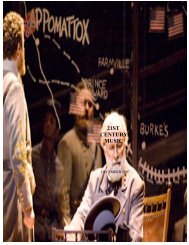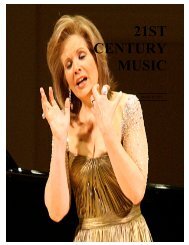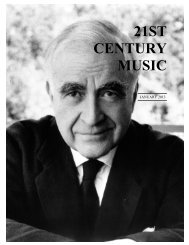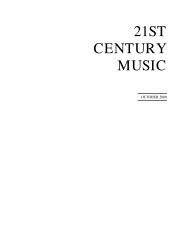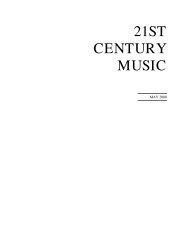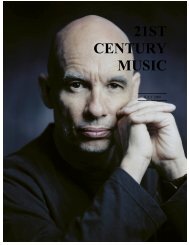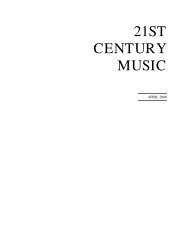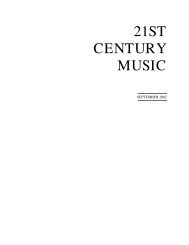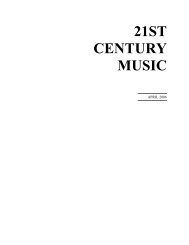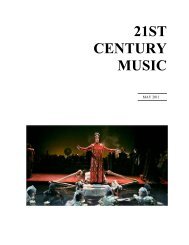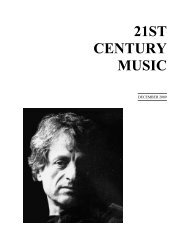You also want an ePaper? Increase the reach of your titles
YUMPU automatically turns print PDFs into web optimized ePapers that Google loves.
LANG: I actually think all of my work has a serious intent. I<br />
think that so much of what we are taught in music is the great<br />
man and the great deep thoughts. In some areas of classical<br />
music, we're only encouraged to write the great masterpieces<br />
that take on the great subjects, and only are about life and<br />
death. There's nothing wrong with that; I think that probably<br />
people can still write music that's pretty good that way. But I<br />
think there's something anticlimactic about it, if you go to a<br />
concert, and there's a piece which proclaims itself a<br />
masterpiece and says it's about dark, serious issues, and it's<br />
going to make you cry. And then at the end of the piece, so<br />
you're in the audience crying. But what a letdown. You're<br />
just getting what was promised! It's as if the composer is<br />
standing there smugly at the end saying, "Oh, I'm proud of<br />
myself. See, I told you that you would cry." To me, I think<br />
it's very important to have the experience that's unexpected. I<br />
think I'm more affected by things in which I have to uncover<br />
the serious intent, than when the serious intent is presented for<br />
me on a platter. <strong>Music</strong> in our lives is incredibly manipulative.<br />
Most of the music that we hear is music that is supposed to<br />
make us feel something specific, and we know exactly how<br />
we're supposed to feel. Buy this kind of cereal or car, or feel<br />
this emotion in this movie or TV show. We know what those<br />
emotions are; there's no room for subtlety. Classical music<br />
has a nobility now. It is the only musical experience where<br />
you can have the unexpected emotion -- where you're free to<br />
decide for yourself. I think for me, that realization has made<br />
me make my music more abstract.<br />
ALBURGER: You're not interested in the easy manipulation<br />
-- the easy answer.<br />
LANG: Well... Just for myself, I'm not interested in it. I<br />
recognize its value. I recognize when it's in other people's<br />
music, that that might be perfectly valid. But for me, I want to<br />
have the non-television, non-commercial experience.<br />
ALBURGER: It becomes an interesting challenge, I imagine,<br />
because, if you take a large scale work like your Modern<br />
Painters -- an opera, a music drama -- there's a certain<br />
expectation that you're going to take the audience from point<br />
A to point B. How do you factor that in<br />
LANG: It's the frustrating thing! I learned a lot of things<br />
doing that opera, because it was my first grand opera (I had<br />
done smaller things before). This was a traditional opera,<br />
from a traditional commissioner, for a traditional opera house,<br />
working with very traditional singers. Normally in my life, I<br />
don't work with singers with big vibratos. But I was interested<br />
in figuring out what my relation with the tradition was,<br />
because I am, in many ways, kind of a traditional composer, I<br />
think.<br />
LANG: I put my notes down on paper, and I believe in those<br />
musical worlds. I have a problem with them, but I believe in<br />
them. I believe in the orchestral world. I don't like orchestras<br />
and the way orchestra works are being written now, and I have<br />
a tremendous problem with the whole environment, but,<br />
theoretically, I don't believe that everything in that world has<br />
been said. I believe that there are certain social things about<br />
that world and the way that world is set up which make it<br />
difficult to say anything other that what is being said at<br />
present. I basically think that's a big shame. I don't think that<br />
means that...<br />
ALBURGER: ...you need to give up.<br />
LANG: Well, it doesn't mean for me to give up. Whether or<br />
not that world has given up on me is another question. I'm in<br />
an interesting place in relation to the orchestral world and the<br />
opera world, too, because I'm interested in sort of being an<br />
experimental traditionalist. I sort of figured out what I do<br />
recently. It sounds really silly to even put a label on it. I was<br />
watching something on television where somebody was riding<br />
a bicycle off a cliff, or whatever. I just realized I do Extreme<br />
Classical <strong>Music</strong>. In The Passing Measures, why not have this<br />
beautiful sound last for 45 minutes and change very little<br />
Why not take something which is given -- that the orchestra<br />
can make a beautiful sound -- and put it under a microscope,<br />
and blow it out of proportion, and make something that's<br />
ridiculous and anti-classical music about it But the basic<br />
world that the idea comes from is the classical music world.<br />
ALBURGER: And perhaps, in order to "get the music" in<br />
some sense, one needs to have some sort of connection to that<br />
world.<br />
LANG: Yes. Well, that's an interesting problem for me,<br />
because that's what I'm interested in. But what that means is<br />
that the establishment that knows enough to appreciate what<br />
I'm doing is also exactly the audience that is not interested in<br />
the work! But that's the world I've chosen to live in!<br />
ALBURGER: Again Schoenberg's line to Cage about<br />
"banging your head against the wall."<br />
LANG: Yes. So, back to the opera. It is a very traditional<br />
opera, but I tried to do some things that I considered<br />
subversive. It's about the life of John Ruskin.<br />
ALBURGER: Right.<br />
ALBURGER: You put your notes down on paper.<br />
3



